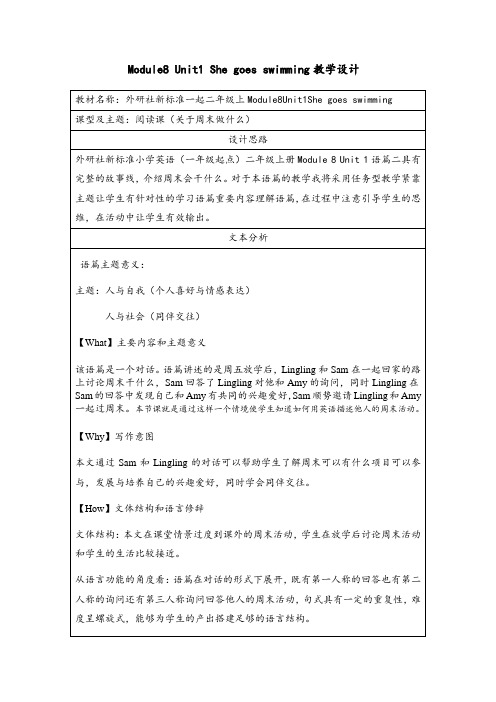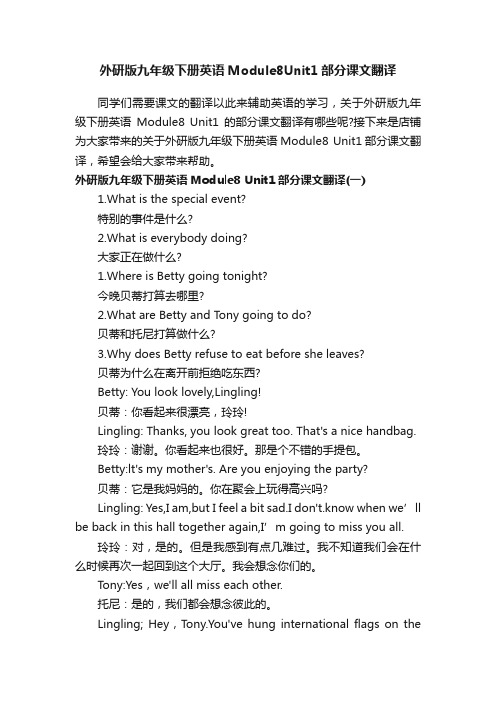二册Module 8 Unit 1
Module8 Unit1 She goes swimming(教案)外研版(一起)英语二年级上册

教材名称:外研社新标准一起二年题:阅读课(关于周末做什么)
设计思路
外研社新标准小学英语(一年级起点)二年级上册Module8 Unit1语篇二具有完整的故事线,介绍周末会干什么。对于本语篇的教学我将采用任务型教学紧靠主题让学生有针对性的学习语篇重要内容理解语篇,在过程中注意引导学生的思维,在活动中让学生有效输出。
教学目标
在学完本课后,学生能够:
1.在看、听、说活动中理解语篇的意义,梳理Sam,Amy和Lingling的周末活动;
2.运用所学,小组合作中完成课堂小调查。
3.利用周末时间参加一些有益的活动,发展自己的兴趣爱好,丰富自己的业余生活,通过同伴以及家人交往增进情感,建立良好的关系。
教学重点和难点
教学重点:1.理解weekend的意思。
I am happy.
Step2 Lead-in
Now, listen! Class is over
Look! What does Ms.Smart say?
What is the weekend? Listen!
The weekend is Saturday and Sunday.
Do you like the weekend? Yes, I do. I like Saturday and Sunday.
2.学生能够用英语谈论自己和他人的周末活动。
教学难点:学生们能够描述他人周末的活动并邀请他人一起过周末。
教学资源
多媒体
教学过程
教学步骤与时间安排
教学活动
设计意图
Pretask activities
Introduction to topic and task.
Module8 Unit1 We’re going外研版(三起)英语四年级上册

Part 4
词组 句子总结
熟练掌握重点内容
——
词组总结:
➢ ➢ ➢ ➢ ➢
1.visit Hainan 参观海南
2. by plane 乘飞机
3. get up
起床
4. at 5 o’clock 在5点
5. in the sea 在海里
1.We’re going to visit Hainan at 5 o’clock. 我们5点钟将要参观海南。 2. We’re going to swim in the sea. 我们将要在海里游泳。 3.I’m going to get up at 5 o’clock. 我将要5点钟起床。 4.I am going to go by plane. 我将要乘飞机去。
swim in the sea
He is going to visit Hainan.
visit Hainan
1.We’re going to get up at_5_____o’clock. 2.We’re going byp_l_a_n__e_.(飞机) 3.I’m going to visit__H__a_i_n_a__n___.(海南) 4.I’m going to_s__w__im___(游泳)in the sea.
Homework.
1.Read the text fluently. 熟读课文。 2.Do Exercise 3 and Exercise 5 on your Exercise Books. 做配套练习册第三题和第五题。 3.Write 3 things you are going to do tomorrow. 写出三件你明天打算做的事情。 I’m going to…tomorrow.
三年级下册英语《Module 8 Unit 1It’s on your desk》教学设计

三年级下册英语《Module 8 Unit 1It’s on your desk》教学设计三年级下册英语《Module 8 Unit 1It’s on your desk》教学设计Module 8 Unit 1It’s on your desk一、教学内容外研社新标准小学英语三年级下册Module 8 Unit 1It’s on your desk.二、教材分析本课是《新标准英语》(三年级起点)三年级下册Module 8 Unit 1。
本模块以Position即方位为话题,Unit1呈现了Daming通过阅读朋友留下的字条寻找自己的生日礼物的场景。
本单元的语言功能是用介词in、on、under、behind描述物品所在的位置。
三、教学目标《英语课程标准》提出基础阶段英语课程的总体目标是培养学生综合语言运用能力,结合这一总目标和学生实际情况,我将本课的教学目标设计如下:1、知识目标:(1)学生能听、说、认读单词toy, under, for, box, behind, bedroom(2)学生能听会说句子It’s in/on/under/behind…Where is…?(3)学生能用Where is…?It’s in/on/under/behind…The...is...句型描述物品位置2、技能目标:通过引导学生积极参与各项课堂活动,使学生养成动脑、动口、动手的好习惯,使学生能够熟练应用本课所学的语言和知识来描述物体位置,进行日常交际,形成语言综合运用能力。
3、情感目标:通过引导学生参与游戏,表演对话等丰富多彩的教学活动,营造轻松愉快的教学氛围,培养学生的学习兴趣。
在学习过程中,让学生有不乱摆放物品,爱整洁的意识。
二、教学重、难点培养学生在特定语境内领悟和使用语言交际的能力是小学英语的重点。
本课的句型It’s in/on/under/behind...Where is ...? 对培养学生的会话能力起着极其重要的作用,所以能听会说及作出相应回答是本课的教学重点。
Module8Unit1教学课件英语八年级上册(完整版)

Listen and underline the correct words.
1 The driver was / was not going fast.2 The driver was / was not looking.3 The driver was / was not talking on his mobile phone.
(肤色)苍白的 出现;显露 转到(某物的)另一边 拐角;街角 (使)碰撞 高兴的;欢喜的
危险;风险 注意力
(物体或形状的)侧面
Expression
in time fall off...
pay attention side by side
及时 从……跌落 注意;留心
并排地;肩并肩地
连连看
pale /peɪl/ appear /ə'pɪə/ round /raʊnd/ corner /'kɔ:nə/ hit/hɪt/ glad /glæd/ risk /rɪsk/ attention /ə'tenʃn/ side /saɪd/
All: Don’t listen to music!
贝蒂:所以那辆汽车撞了那个男孩吗?詹姆斯老师: 没有,我很高兴地说。汽车恰好及时停下,但男 孩从自行车上摔了下来,伤了膝盖。托尼:那太 糟了。詹姆斯老师:所以当你们骑自行车的时候, 想想(发生)事故的风险! 注意,在红灯前停下来 和⋯⋯还有什么?贝蒂:不要骑得太快。大明:不 要和你的朋友们并肩骑行。詹姆斯老师:还有别 的吗?所有人:不要听音乐!
Listen and read. Betty: Good morning, Ms James! You look pale. Are you all right?Ms James: I'm OK, but I saw an accident. A boy was riding his bike and listening to music on the road.Daming: That's very dangerous!Ms James: I was waiting to cross the road. While the lights were changing to red, a ca suddenly appeared round the corner. It wasn't going fast, but it didn't stop.Lingling: Did the boy stop?Ms James: No. And the driver was talking on his mobile phone.
外研版九年级下册英语Module8Unit1部分课文翻译

外研版九年级下册英语Module8Unit1部分课文翻译同学们需要课文的翻译以此来辅助英语的学习,关于外研版九年级下册英语Module8 Unit1的部分课文翻译有哪些呢?接下来是店铺为大家带来的关于外研版九年级下册英语Module8 Unit1部分课文翻译,希望会给大家带来帮助。
外研版九年级下册英语Module8 Unit1部分课文翻译(一)1.What is the special event?特别的事件是什么?2.What is everybody doing?大家正在做什么?1.Where is Betty going tonight?今晚贝蒂打算去哪里?2.What are Betty and Tony going to do?贝蒂和托尼打算做什么?3.Why does Betty refuse to eat before she leaves?贝蒂为什么在离开前拒绝吃东西?Betty: You look lovely,Lingling!贝蒂:你看起来很漂亮,玲玲!Lingling: Thanks, you look great too. That's a nice handbag.玲玲:谢谢。
你看起来也很好。
那是个不错的手提包。
Betty:lt's my mother's. Are you enjoying the party?贝蒂:它是我妈妈的。
你在聚会上玩得高兴吗?Lingling: Yes,I am,but I feel a bit sad.I don't.know when we’ll be back in this hall together again,I’m going to miss you all.玲玲:对,是的。
但是我感到有点几难过。
我不知道我们会在什么时候再次一起回到这个大厅。
我会想念你们的。
Tony:Yes,we'll all miss each other.托尼:是的,我们都会想念彼此的。
Module 8 Unit 1 外研版英语九年级上册知识点详解

外研版九(上)Module 8 Sports life知识点详解Unit 1 Daming wasn’t chosen for the team last time.★(A3).【知识点再现】Hi, Tony, you look tired. 你好, 托尼! 你看起来很累。
【知识点1】look tired意为“看起来累”。
look用着系动词,意为“看起来”,其后常接形容词作表语。
类似系动词还有:taste/sound/smell/feel/seem/become/get / turn...+adj.(形容词)。
如:She looked a little tired. 她看起来有点疲倦。
You look beautiful in this green dress. 你穿这条绿裙子看起来很漂亮。
★(A3).【知识点再现】Who are you playing against? 你们和哪个队比赛?【知识点2】play against...意为“与……比赛/对抗”。
against是介词,意为“与……相反/相对;反对;违背”,通常与be连用,短语be against意为“反对”。
其反义词为be for意为“赞成”。
如:Our team played against Class Three. 我们队与三班进行了比赛。
The soldiers fought against the enemies fiercely. 战士们与敌人激烈战斗。
Are you against or for this plan? 你是反对还是赞成这个计划?★(A3).【知识点再现】What does HAS stand for? HAS代表什么?【知识点3】【辨析】stand for与represent的用法辨析:①stand for意为“代表,象征,是……的缩写,意味着”,多指抽象物体,是指用字母、数字或符号来表示一个单词,名字或是某个概念的缩写形式,其同义词为be short for或represent。
外研英语Module8 Unit 1
2. A: Do you think you'll buy that one?
B: No way! That's the ugliest picture I've ever seen! A: It's not that bad. B: Are you kidding? I could do better than that.
Listen again and complete the table.
Basketball competition
Teams
Scores of last match Time of next match Lingling’s favourite team to win
HAS
against
BIG
HAS 98 : BIG 52
在句子中比较重要的词都要重读,使这 个词的发音响亮而清晰;相反,轻而含 糊的是轻读音。
在重读音节之间的弱读音节要读得较快 一些,好像是音乐中的打拍子一样。在 学习句子的读法时,特别要体会“一轻 一重”或“一重一轻”的节奏感。
Read and think which words sound weak and which words sound strong.
Read the sentences from the conversation. Say who the underlined words refer to.
1. You look tired. Tony 2. Didn’t they beat you last time. BIG 3. Are you coming?
Complete the following sentences using Everyday English.
外研版八年级英语下册Module8 Unit1 I can hardly believe we’re
3 “I’m so hungry and thirsty.” Does Daming want something to
drink? Daming wants something to drink.
4 “Let’s not waste any more time.” Does Tony think they are spending
Let the word fly
Tips for teacher
Let the word fly板块是帮助学生学 习一些一词多义、熟词生义的词汇。 通过此环节,学生可以对一些常见 词的用法、意思有一个透彻的了解。
收t拾id,y整~ 理
占ta用空ke(间时~)间 up
hu快rr点y ~
出c现om, e发~生
2 “Then I can point out the sights of Beijing for you.”
Does Lingling want them to look at something or listen to something?
Lingling wants them to look at something.
Listen to the conversation and find out what the conversation is about?
The conversation is about going to Beihai Park.
Listen again and choose the correct answer.
He works hard. 他努力工作。 He hardly works. 他几乎不工作。
Practise
Helen was so excited at the news that
外研一起小学英语二年级上册Module8《Unit1Shegoesswimming》课件
She watches TV at the weekend.
She reads books at the weekend.
He plays football at the weekend.
He plays ping pong at the weekend.
He/She …….at the weekend. watches TV goes swimming plays football
第三人称单数变形
watch ---- watches go ---- goes
read ---- reads do ---- does play ---- plays like ---- likes
I watch TV at the weekend.
The boy watches TV at the weekend.
How about Amy? She goes swimming. She watches TV and she reads books.
Listen and check
1. Today is weekend. V 2. Amy plays football at the weekend.X 3. Sam watches TV at the weekend.V 4. Lingling likes books. V
Bingbing
He plays basketball and watches TV at the weekend.
She reads books at the weekend. He plays football at the weekend.
He goes swimming at the weekend.
外研版八年级下册英语Module8 Unit1课文翻译
外研版八年级下册英语Module8 Unit1课文翻译1Look at the photo and listen.部分翻译Look at the photo and listen. What is the conversation about?看照片,听录音。
对话是关于什么的?2Listen again and choose the correct answer.部分翻译1 Tony has/hasn't heard about Beihai Park.托尼听说过/没听说过北海公园。
2 Tony guesses that the park is very popular/ not very popular.托尼猜测这个公园很受欢迎/不受欢迎。
3 Lingling suggests that they spend the day there/Daming and Betty come too. 玲玲建议他们在那儿度过一天/大明和贝蒂也来。
4 Lingling thinks/doesn't think the park will be busy.玲玲认为这个公园会/不会人山人海。
3Listen and read.部分翻译Lingling: Here we are. Welcome to Beihai Park.玲玲:我们到了。
欢迎来到北海公园。
Tony:Wow! It's so quiet here that I can even hear the birds singing! I can believe we're jn the city centre.托尼:哇!这里如此安静以至于我甚至能听见鸟儿在歌唱!我几乎不能相信我们在市中心。
Lingling:This park is famous for its lake, bridges and the ancient buildings on the hill. The lake takes up over half of the park area. Let's walk along the lake,cross the bridge and climb up the hill, Then I can point out the sights of Beijing for you.玲玲:这个公园因为它的湖、桥和山上的古建筑而闻名。
- 1、下载文档前请自行甄别文档内容的完整性,平台不提供额外的编辑、内容补充、找答案等附加服务。
- 2、"仅部分预览"的文档,不可在线预览部分如存在完整性等问题,可反馈申请退款(可完整预览的文档不适用该条件!)。
- 3、如文档侵犯您的权益,请联系客服反馈,我们会尽快为您处理(人工客服工作时间:9:00-18:30)。
Summer, summer, summer. It’s summer.
Hot, hot, hot. It’s hot.
Swimming, swimming, swimming. We go swimming.
Autumn, autumn, autumn. It’s autumn. Cool, cool, cool. It’s cool. Football, football, football. We play football.
• Homework
• Talk about the changes such as our school ,your English book ,your family.
Thank you.
then
now
then
now
then
now
then
now
then
now
then
now
was
• • • • • •
were
I ___ two,then. Lingling ____ fat ,then. They ____ young,then. She ____ so cute,then. She ____ very naughty,then. You _____ short,then.
was was I was was was she was was was he was was was it was
I was 7,then.
那时 ,我七岁。
I was short ,then. I was fat ,then.
Were是are的过去式。
Were were you were Were were we were Were were they were
grandparents
Then
Now
They ,they are old.
Who is that little girl? 谁 Her hair was so short.
Listen and answer the questions
• 1.Who is the little girl? • Were her grandparents young ,then?
新标准英语三起二册
Module 8 Unit 1
It’s hot in summer.
Let’s sing.
Spring, spring, spring. It’s spring. Warm, warm, warm. It’s warm.
Kites, kits, kites. We fly kites.
Winner, winner, winner. It’s winner. Cold, cold, cold. It’s cold. TV, TV, TV. We watch TV.
summer
Practice in your group.
Do you know ?
★Was 是am和 is的过去式。
